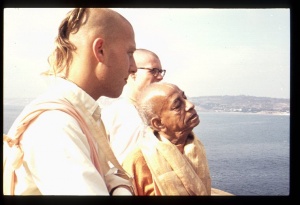SB 2.7.38: Difference between revisions
No edit summary |
(Vanibot #0054 edit - transform synonyms into clickable links, which search similar occurrences) |
||
| Line 23: | Line 23: | ||
<div class="synonyms"> | <div class="synonyms"> | ||
''yarhi'' | ''[//vanipedia.org/wiki/Special:VaniSearch?s=yarhi&tab=syno_o&ds=1 yarhi]'' — when it happens; ''[//vanipedia.org/wiki/Special:VaniSearch?s=ālayeṣu&tab=syno_o&ds=1 ālayeṣu]'' — in the residence of; ''[//vanipedia.org/wiki/Special:VaniSearch?s=api&tab=syno_o&ds=1 api]'' — even; ''[//vanipedia.org/wiki/Special:VaniSearch?s=satām&tab=syno_o&ds=1 satām]'' — civilized gentlemen; ''[//vanipedia.org/wiki/Special:VaniSearch?s=na&tab=syno_o&ds=1 na]'' — no; ''[//vanipedia.org/wiki/Special:VaniSearch?s=hareḥ&tab=syno_o&ds=1 hareḥ]'' — of the Personality of Godhead; ''[//vanipedia.org/wiki/Special:VaniSearch?s=kathāḥ&tab=syno_o&ds=1 kathāḥ]'' — topics; ''[//vanipedia.org/wiki/Special:VaniSearch?s=syuḥ&tab=syno_o&ds=1 syuḥ]'' — will take place; ''[//vanipedia.org/wiki/Special:VaniSearch?s=pāṣaṇḍinaḥ&tab=syno_o&ds=1 pāṣaṇḍinaḥ]'' — atheists; ''[//vanipedia.org/wiki/Special:VaniSearch?s=dvija&tab=syno_o&ds=1 dvija]-[//vanipedia.org/wiki/Special:VaniSearch?s=janāḥ&tab=syno_o&ds=1 janāḥ]'' — persons declaring themselves to be the higher three classes (brāhmaṇas, kṣatriyas and vaiśyas); ''[//vanipedia.org/wiki/Special:VaniSearch?s=vṛṣalāḥ&tab=syno_o&ds=1 vṛṣalāḥ]'' — the lower class śūdras; ''[//vanipedia.org/wiki/Special:VaniSearch?s=nṛ&tab=syno_o&ds=1 nṛ]-[//vanipedia.org/wiki/Special:VaniSearch?s=devāḥ&tab=syno_o&ds=1 devāḥ]'' — ministers of the government; ''[//vanipedia.org/wiki/Special:VaniSearch?s=svāhā&tab=syno_o&ds=1 svāhā]'' — hymns to perform sacrifices; ''[//vanipedia.org/wiki/Special:VaniSearch?s=svadhā&tab=syno_o&ds=1 svadhā]'' — the ingredients to perform sacrifices; ''[//vanipedia.org/wiki/Special:VaniSearch?s=vaṣaṭ&tab=syno_o&ds=1 vaṣaṭ]'' — the altar of sacrifice; ''[//vanipedia.org/wiki/Special:VaniSearch?s=iti&tab=syno_o&ds=1 iti]'' — all these; ''[//vanipedia.org/wiki/Special:VaniSearch?s=sma&tab=syno_o&ds=1 sma]'' — shall; ''[//vanipedia.org/wiki/Special:VaniSearch?s=giraḥ&tab=syno_o&ds=1 giraḥ]'' — words; ''[//vanipedia.org/wiki/Special:VaniSearch?s=na&tab=syno_o&ds=1 na]'' — never; ''[//vanipedia.org/wiki/Special:VaniSearch?s=yatra&tab=syno_o&ds=1 yatra]'' — anywhere; ''[//vanipedia.org/wiki/Special:VaniSearch?s=śāstā&tab=syno_o&ds=1 śāstā]'' — the chastiser; ''[//vanipedia.org/wiki/Special:VaniSearch?s=bhaviṣyati&tab=syno_o&ds=1 bhaviṣyati]'' — will appear; ''[//vanipedia.org/wiki/Special:VaniSearch?s=kaleḥ&tab=syno_o&ds=1 kaleḥ]'' — of the Kali age; ''[//vanipedia.org/wiki/Special:VaniSearch?s=bhagavān&tab=syno_o&ds=1 bhagavān]'' — the Personality of Godhead; ''[//vanipedia.org/wiki/Special:VaniSearch?s=yuga&tab=syno_o&ds=1 yuga]-[//vanipedia.org/wiki/Special:VaniSearch?s=ante&tab=syno_o&ds=1 ante]'' — at the end of. | ||
</div> | </div> | ||
Latest revision as of 21:19, 17 February 2024

A.C. Bhaktivedanta Swami Prabhupada
TEXT 38
- yarhy ālayeṣv api satāṁ na hareḥ kathāḥ syuḥ
- pāṣaṇḍino dvija-janā vṛṣalā nṛdevāḥ
- svāhā svadhā vaṣaḍ iti sma giro na yatra
- śāstā bhaviṣyati kaler bhagavān yugānte
SYNONYMS
yarhi — when it happens; ālayeṣu — in the residence of; api — even; satām — civilized gentlemen; na — no; hareḥ — of the Personality of Godhead; kathāḥ — topics; syuḥ — will take place; pāṣaṇḍinaḥ — atheists; dvija-janāḥ — persons declaring themselves to be the higher three classes (brāhmaṇas, kṣatriyas and vaiśyas); vṛṣalāḥ — the lower class śūdras; nṛ-devāḥ — ministers of the government; svāhā — hymns to perform sacrifices; svadhā — the ingredients to perform sacrifices; vaṣaṭ — the altar of sacrifice; iti — all these; sma — shall; giraḥ — words; na — never; yatra — anywhere; śāstā — the chastiser; bhaviṣyati — will appear; kaleḥ — of the Kali age; bhagavān — the Personality of Godhead; yuga-ante — at the end of.
TRANSLATION
Thereafter, at the end of Kali-yuga, when there exist no topics on the subject of God, even at the residences of so-called saints and respectable gentlemen of the three higher castes, and when the power of government is transferred to the hands of ministers elected from the lowborn śūdra class or those less than them, and when nothing is known of the techniques of sacrifice, even by word, at that time the Lord will appear as the supreme chastiser.
PURPORT
The symptoms of the worst conditions of the material world, at the last stage of this age, called Kali-yuga, are stated herein. The sum and substance of such conditions is godlessness. Even the so-called saints and higher castes of the social orders, generally known as the dvija janas or the twice-born, will become atheists. As such, all of them will practically forget even the holy name of the Lord, and what to speak of His activities. The higher castes of society, namely the intelligent class of men guiding the destinies of the social orders, the administrative class of men guiding the law and order of the society, and the productive class of men guiding the economic development of the society, must all be properly well versed in knowledge of the Supreme Lord, knowing factually His name, quality, pastimes, entourage, paraphernalia and personalities. The saints and the higher castes or orders of the society are judged by their proportion of knowledge in the science of God, or tattva jñāna, and not by any kind of birthright or bodily designations. Such designations, without any knowledge of the science of God and practical knowledge of devotional service, are considered to be all decorations of dead bodies. And when there is too much inflation of these decorated dead bodies in society, there develop so many anomalies in the progressive, peaceful life of the human being. Because of the lack of training or culture in the upper section of the social orders, they are no more to be designated as the dvija janas, or the twice-born. The significance of being twice-born has been explained in many places in these great literatures, and again one is reminded herewith that birth, executed by the sex life of the father and the mother, is called animal birth. But such animal birth and progress of life on the animal principles of eating, sleeping, fearing and mating (without any scientific culture of spiritual life) is called the śūdra life, or, to be more explicit, the uncultured life of the lower class of men. It is stated herein that the governmental power of society in the Kali-yuga will be passed over to the uncultured, godless laborer classes of men, and thus the nṛdevas (or the ministers of the government) will be the vṛṣalas, or the uncultured lower-class men of society. No one can expect any peace and prosperity in a human society full of uncultured lower classes of men. The symptoms of such uncultured social animals are already in vogue, and it is the duty of the leaders of men to take note of it and try to reform the social order by introducing the principles of twice-born men trained in the science of God consciousness. This can be done by expanding the culture of Śrīmad-Bhāgavatam all over the world. In the degraded condition of human society, the Lord incarnates as the Kalki avatāra and kills all the demonic without mercy.